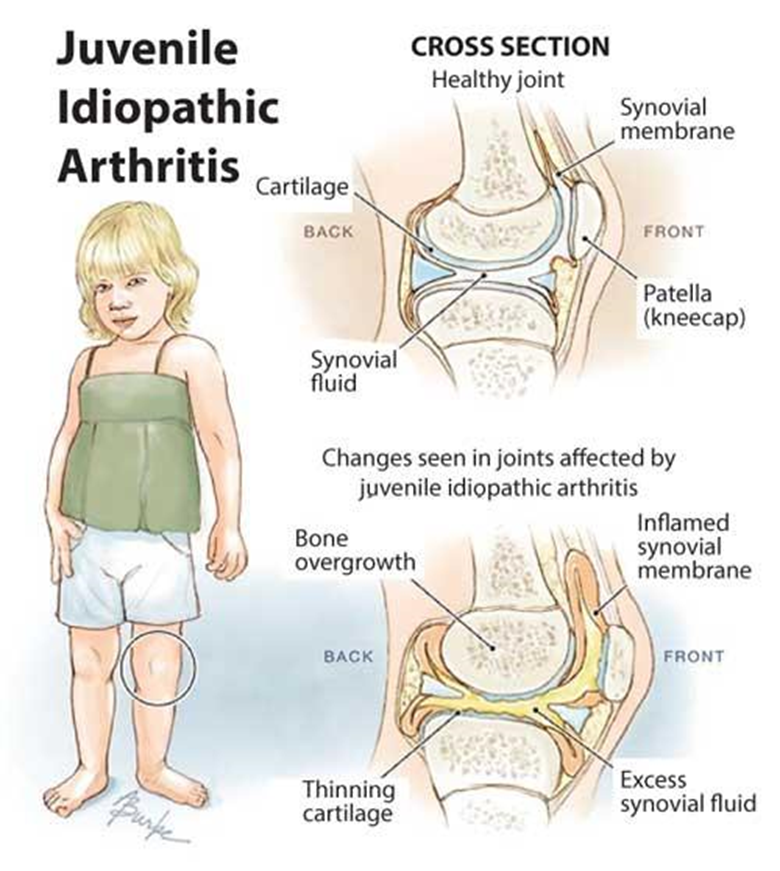A nurse is providing discharge instructions to a parent and his school-age child who has juvenile idiopathic arthritis. Which of the following
instructions should the nurse include?
Encourage the child to take a 45 min nap daily
Administer prednisone on an alternate day schedule
Apply cool compresses for 20 min every hour
Allow the child to stay at home on days when her joints are painful
The Correct Answer is B
Choice A reason: Encouraging the child to take a 45 min nap daily is not a helpful instruction, as it may interfere with the child's normal sleep pattern and school schedule. The child may benefit from regular rest periods throughout the day, but not necessarily a long nap. ⁵
Choice B reason: Administering prednisone on an alternate day schedule is a helpful instruction, as it is a common way of prescribing corticosteroids for children with juvenile idiopathic arthritis. Corticosteroids are used to reduce inflammation and control symptoms, but they have many side effects, such as growth suppression, weight gain, and osteoporosis. Giving the medication every other day may reduce some of these side effects and improve compliance. ⁶

Choice C reason: Applying cool compresses for 20 min every hour is not a helpful instruction, as it may cause skin damage and discomfort. Cool compresses may be useful for acute inflammation, but not for chronic arthritis. Warm compresses or baths may be more soothing and beneficial for the child's joints. ⁷
Choice D reason: Allowing the child to stay at home on days when her joints are painful is not a helpful instruction, as it may lead to social isolation, academic difficulties, and reduced physical activity. The child should be encouraged to attend school and participate in activities as much as possible, with appropriate accommodations and modifications if needed. The child may also benefit from physical therapy, occupational therapy, and pain management strategies. ⁸
Nursing Test Bank
Naxlex Comprehensive Predictor Exams
Related Questions
Correct Answer is B
Explanation
Choice A reason: Haemophilus influenzae type b (Hib) vaccine is not the correct choice, as it is usually given to children at 2, 4, 6, and 12 to 15 months of age. A 4-year-old child should have already completed the Hib vaccine series.
Choice B reason: Varicella (VAR) vaccine is the correct choice, as it is recommended for children at 12 to 15 months and 4 to 6 years of age. A 4-year-old child is due for the second dose of the VAR vaccine.
Choice C reason: Hepatitis B (HepB) vaccine is not the correct choice, as it is usually given to children at birth, 1 to 2 months, and 6 to 18 months of age. A 4-year-old child should have already completed the HepB vaccine series.
Choice D reason: Meningococcal (MCV4) vaccine is not the correct choice, as it is not routinely recommended for children younger than 11 years of age. MCV4 vaccine is given to children at 11 to 12 years and 16 years of age, or to children with certain high-risk conditions.
Correct Answer is C
Explanation
Choice A reason: A respiratory rate of 24 breaths/min is within the normal range for a 3-year-old child. It does not indicate the degree of hydration or dehydration of the child.
Choice B reason: A heart rate of 130/min is above the normal range for a 3-year-old child, which is 80 to 120/min. It may indicate dehydration, fever, pain, or anxiety. It does not indicate the effectiveness of oral rehydration therapy.
Choice C reason: A urine specific gravity of 1.015 is within the normal range for a child, which is 1.005 to 1.030. It indicates that the child's urine is adequately concentrated and that the child is well hydrated. It is a reliable indicator of the effectiveness of oral rehydration therapy.

Choice D reason: A capillary refill of greater than 3 seconds is abnormal and indicates poor peripheral perfusion. It may be a sign of dehydration, shock, or hypothermia. It does not indicate the effectiveness of oral rehydration therapy.
Whether you are a student looking to ace your exams or a practicing nurse seeking to enhance your expertise , our nursing education contents will empower you with the confidence and competence to make a difference in the lives of patients and become a respected leader in the healthcare field.
Visit Naxlex, invest in your future and unlock endless possibilities with our unparalleled nursing education contents today
Report Wrong Answer on the Current Question
Do you disagree with the answer? If yes, what is your expected answer? Explain.
Kindly be descriptive with the issue you are facing.
